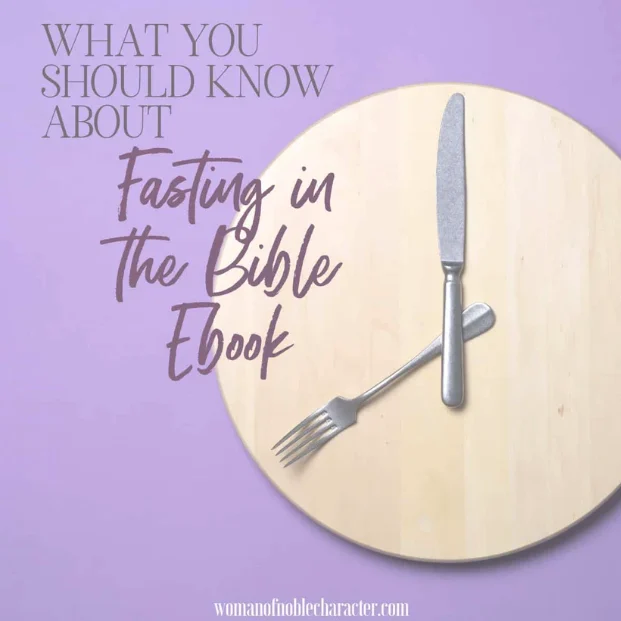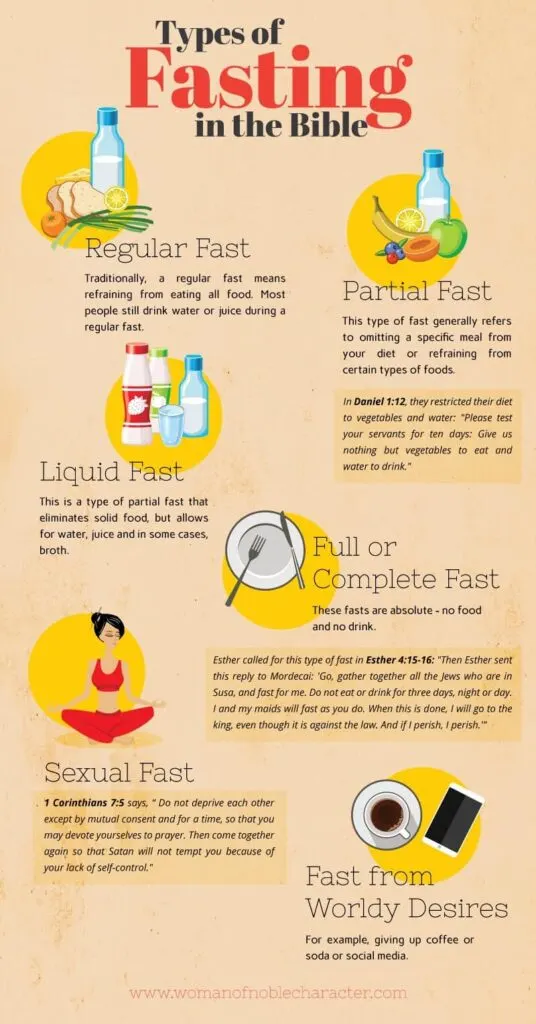This page/post may contain affiliate links. As an Amazon Associate, as well as an affiliate of other programs, this means if you purchase something using these links, I will receive a commission on qualifying purchases at no cost to you! For more detailed information, please visit our Affiliate Disclaimer page
Have you ever wondered what the Bible says about fasting? Or even the types of fasting in the Bible?
Perhaps you’ve considered fasting and were curious what the rewards and benefits of a biblical fast were.
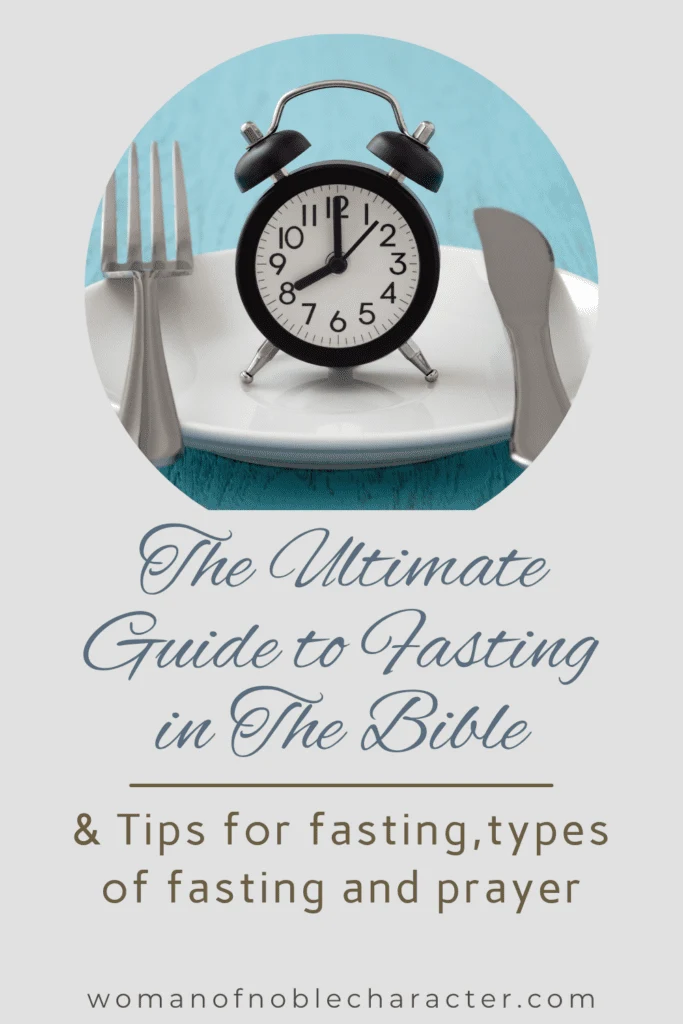
We’re going to cover all that and more in this post so that you can learn more about fasting in the Bible and how to fast for a spiritual breakthrough.
Deepen Your Relationship with the Lord by Fasting ebook
WHAT YOU’LL LEARN…
- Different types of fasting in the Bible
- Biblical characters who fasted and why
- Why Fast and the Benefits of Biblical Fasting
- How to prepare for a fast
- After Fasting and Ending Your Fast
- Tips for fasting
What is Fasting?
The word fasting means to abstain from something. Most commonly, fasting refers to abstaining from food, but it can include abstaining from other things, as well.
Biblical fasting can be defined as abstaining from food or something else for a period of time in order to focus your thoughts on God. Going without food (or whatever you are fasting from) for medical reasons or lack is not biblical fasting.
What the Bible Says About Fasting
Fasting is mentioned over fifty times throughout the Bible! Throughout this post, I’ll share some of the Bible verses about fasting, but, for deeper study, you can download and print this PDF on Bible verses about fasting.
(Note: the PDF includes most of the verses about fasting, but I have omitted some that were very similar or, where the reference to fasting was vague.)
You may wish to use the verses about fasting for your own study, use for Bible journaling references or to write the scripture in your prayer journal as you go through your own fast.
The first time fasting is mentioned in the Bible is in Exodus 34:
Moses was there with the Lord forty days and forty nights without eating bread or drinking water. And he wrote on the tablets the words of the covenant—the Ten Commandments. – Exodus 34:28
The last time fasting is referred to in the Bible is in 2 Corinthians 11:27
I have labored and toiled and have often gone without sleep; I have known hunger and thirst and have often gone without food; I have been cold and naked. – 2 Corinthians 11:27
(This one is not listed on the PDF as it is not clear that it is truly about fasting or lack)
Clearly, fasting is an important biblical concept.
You can expect to feel more spiritually connected with God from a fast. It is crucial that during these times of fasting, we purify our souls by connecting one-on-one in prayer and meditation so as not to miss out on His blessings because they might be what’s needed at this point in time!
When you spend time with God, He will answer your prayers. – not always in the way we expect, however! Meditate on Him and His Word and sing His praise because through worshiping at the foot of Christ, we experience an unshakeable bond between ourselves as warriors fighting spiritual darkness while being powered by heavenly light!
Satan will do everything to pull you away from your prayer and Bible reading time, but don’t let him. When the enemy tries discouraging words or actions, enter into God’s presence so that He may strengthen your resolve with Him in facing difficulties of all kinds–including temptation!
Fasting is a powerful discipline that helps us put our faith in God. The enemy wants nothing more than for you and me, as Christians,to grow weak so he can have an opportunity of attacking us–this could be one way the devil tries his best at tempting people who belong to Jesus Christ!
It’s essential to be aware that Satan doesn’t want you to grow in your faith. He will do anything from making people hungry and grumpy or bringing up trouble at home – all the way up to tempting us! Make prayer an integral part of protecting yourself against these attacks by trusting God with every fiber within us as we fight off those fiery darts aimed straight at our hearts.
Spiritual fasting is about giving your whole self over to God. Prayer and praise are essential, but they must be accompanied by a shift in focus from ourselves- toward Him at all times!
During your fast, confess your sins to God as the Holy Spirit brings them to mind and continue focusing on him so that you may be able to pray effectively to The Father.
Fasting is a great way to reconnect with God and become more spiritually sensitive. You may not experience a “mountaintop” moment,
but you will have other rewarding benefits, such as feeling closer than ever before to our Heavenly Father.
The experience of those who fast is often one where they feel a nearness to God that has never been experienced before, but others have honestly sought His face and did not necessarily experience this.
Fasting is a dynamic and powerful spiritual tool that can be used to renew our relationship with God. For some, it was an easy process of self-denial; for others, though their fast became physically/emotionally draining, they knew in themselves that this would help them worship more fully than ever.
The most important thing to remember when fasting is that your motive must always remain God-centered, not focused on an emotional experience or personal happiness; otherwise, it would become a means for self-indulgence instead of glorifying Him to achieve these things. From time spent alone with our Creator!
Let’s dive into some biblical examples of fasting and why we fast.
13 Biblical Examples of Fasting
- One of the most memorable accounts of fasting in the Bible was when Jesus fasted for 40 days to prepare for His battle with Satan and to gain spiritual strength from His Heavenly Father. (Luke 4:1-3 and Matthew 4:1-11)
And Jesus, full of the Holy Spirit, returned from the Jordan and was led by the Spirit in the wilderness for forty days, being tempted by the devil. And he ate nothing during those days. And when they were ended, he was hungry. The devil said to him, “If you are the Son of God, command this stone to become bread.”
Luke 4:1-3 (ESV)
2. Jesus expected His disciples to fast, but cautioned them not to do it for the wrong reasons. (Matthew 6:16).
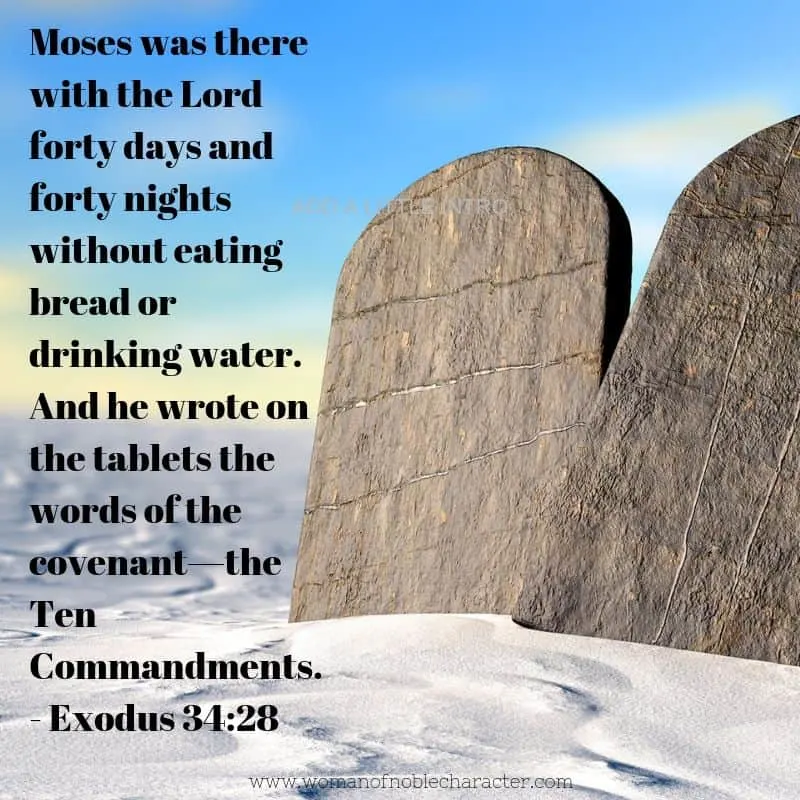
“And when you fast, do not look gloomy like the hypocrites, for they disfigure their faces that their fasting may be seen by others. Truly, I say to you, they have received their reward. But when you fast, anoint your head and wash your face, that your fasting may not be seen by others but by your Father who is in secret. And your Father who sees in secret will reward you.
Matthew 6:16-18 (ESV)
3. In Luke 2:36-37, we learn of Anna, described as “a righteous woman” who “She did not depart from the temple, worshiping with fasting and prayer night and day.”
“And there was a prophetess, Anna, the daughter of Phanuel, of the tribe of Asher. She was advanced in years, having lived with her husband seven years from when she was a virgin, and then as a widow until she was eighty-four. She did not depart from the temple, worshiping with fasting and prayer night and day.”
Luke 2:36-37 (ESV)
4. Nehemiah fasted for several reasons including confession, repentance, and favor of the king so that he might get permission to rebuild the walls of Jerusalem.
“As soon as I heard these words I sat down and wept and mourned for days, and I continued fasting and praying before the God of heaven..”
Nehemiah 1:4 (ESV)
5. We read of David fasting several times, each for different reasons. In Psalm 35:13, he “humbled” with fasting and asked God to intervene in the injustice he was experiencing. In 2 Samuel 12:17,23, he fasted during prayer asking God to heal his sick son.
But I, when they were sick—
I wore sackcloth;
I afflicted myself with fasting;
I prayed with head bowed on my chest.Psalm 35:13 (ESV)
And the elders of his house stood beside him, to raise him from the ground, but he would not, nor did he eat food with them.
2 Samuel 12:17 (ESV)
6. When Jonah preached in the city of Nineveh, the whole city came together and fasted as an act of repentance (Jonah 3:7-10). God rewarded their prayer and fasting by saving the city from destruction.
And he issued a proclamation and published through Nineveh, “By the decree of the king and his nobles: Let neither man nor beast, herd nor flock, taste anything. Let them not feed or drink water, but let man and beast be covered with sackcloth, and let them call out mightily to God. Let everyone turn from his evil way and from the violence that is in his hands. Who knows? God may turn and relent and turn from his fierce anger so that we may not perish.”
When God saw what they did, how they turned from their evil way, God relented of the disaster that he had said he would do to them, and he did not do it.
Jonah 3:7-10 (ESV)
7. There are quite a few mentions of Paul fasting and he lists it as one of the ways he “suffered for the gospel” (2 Corinthians 11:27, but note, as above that we are not clear here if Paul was fasting as an act of worship and prayer or for lack of food). Paul also discusses fasting as part of his instruction for Christian living (1 Corinthians 7:5) as a time to come together in prayer and resist temptation.
8. Mordecai and the Jews fasted after hearing the news of the King’s edict, that all the Jews were to die. (Esther 4:3).
And in every province, wherever the king’s command and his decree reached, there was great mourning among the Jews, with fasting and weeping and lamenting, and many of them lay in sackcloth and ashes.
Esther 4:3 (ESV)
9. In Acts, alone, there are at least six references to fasting. The early church fasted for worship, guidance and the appointment of elders, for example. (Acts 9:9; 13:2; 14:23; 27:9,33).
And for three days he was without sight and neither ate nor drank.
Acts 9:9 (ESV)
10. In Acts, we also learn of Cornelius, who worshiped God with fasting. His fasting is known for being a catalyst for Peter to begin preaching to the Gentiles which was an important beginning to the spreading of the gospel around the world.
- Often in the Bible, God’s people fasted immediately before a major victory, miracle, or answer to prayer. It prepared them for a blessing!
Moses fasted before he received the Ten Commandments. ” So he was there with the Lord forty days and forty nights. He neither ate bread nor drank water. And he wrote on the tablets the words of the covenant, the Ten Commandments.”
Exodus 34:28 (ESV)
- The Israelites fasted before a miraculous victory.
“Some men came and told Jehoshaphat, “A great multitude is coming against you from Edom, from beyond the sea; and, behold, they are in Hazazon-tamar” (that is, Engedi). Then Jehoshaphat was afraid and set his face to seek the Lord, and proclaimed a fast throughout all Judah.”
2 Chronicles 20:2-3 (ESV)
- Daniel fasted to receive guidance from God.
“Then I turned my face to the Lord God, seeking him by prayer and pleas for mercy with fasting and sackcloth and ashes..”
Daniel 9:3 (ESV)
Why Fast and the Benefits of Biblical Fasting
There are many reasons why you might want to practice fasting. All have a focus on creating intimacy with God through recognizing our dependence on Him.
- Admitting our sin and asking God for forgiveness.
2. Spiritual strength against a spiritual attack by the enemy.
3. To break free from the bondage of sin or demonic activity. (Matthew 17:21 NKJV – not found in NIV).
4. To help us hear the voice of God
5. To focus on prayer and help us pray with the right heart and motivation.
6. To awaken a spiritual hunger for God.
7. To allow God to reveal what desires and temptations we have allowed to control us.
8. To temporarily give up good things to make room for things are even better.
9. To reveal sin that we might not be actively aware of.
10. To demonstrate to God that our love and desire for Him is greater than any earthly thing.
11. To increase our intimacy with Him.
12. To intervene in prayer on behalf of others.
13. To ask God for healing for ourselves or others.
- Fasting gives you more time for prayer. You can use the time you’d typically spend eating as time in prayer for what God wants to do in your life. In the Bible, fasting is always connected with prayer.
” While they were worshiping the Lord and fasting, the Holy Spirit said, “Set apart for me Barnabas and Saul for the work to which I have called them.” Then after fasting and praying they laid their hands on them and sent them off..”
Acts 13:2-3 (ESV)
- Although related to a few of the above reasons we should fast, fasting demonstrates the depth of your desire when praying for something. It shows you that you are serious enough about your prayer request to pay a personal price. God honors deep desire and praying in faith.
” Consecrate a fast;
call a solemn assembly.
Gather the elders
and all the inhabitants of the land
to the house of the Lord your God,
and cry out to the Lord..”Joel 1:14 (ESV)
“Yet even now,” declares the Lord,
“return to me with all your heart,
with fasting, with weeping, and with mourning;.”Joel 2:12 (ESV)
- Fasting releases God’s supernatural power. We can use it when there is opposition to God’s will. Satan would like nothing better than to cause division, discouragement, defeat, depression, and doubt among us. God has always used United prayer and fasting to deal a decisive blow to the enemy!
” So we fasted and implored our God for this, and he listened to our entreaty..”
Ezra 8:23 (ESV)
“Is not this the fast that I choose:
to loose the bonds of wickedness,
to undo the straps of the yoke,
to let the oppressed go free,
and to break every yoke?Isaiah 58:6 (ESV)
Why You Shouldn’t Fast and The Wrong Motivations for Fasting
- To gain recognition by others. Fasting so that others will say “Look at her. She fasts. She’s such a wonderful Christian!” is wrong. If others notice that you are fasting, that’s fine, but fasting for such recognition is a sin.
“that your fasting may not be seen by others but by your Father who is in secret. And your Father who sees in secret will reward you.
– Matthew 6:18 (ESV)
- To gain recognition from God. Fasting isn’t an act that you do for God. It acknowledging His power and grace and that you are completely dependent on Him.
- To “up the ante” in hopes that God will answer your prayers. Here’s the thing about this: it’s fine to fast and pray for something (healing, etc.) but it is the FAITH, not the fasting, that is in play here. You may choose to fast as part of your focused prayer time, but, fasting, in and of itself is not a fast track to God answering your prayers.
Let’s take a look at the four main types of fasting in the Bible, as well as fasts that fall under each main type:
Types of Fasting in the Bible
Regular Fast – Traditionally, a regular fast means refraining from eating all food. Most people still drink water or juice during a regular fast. When Jesus fasted in the desert, the Bible says, “After fasting forty days and forty nights, he was hungry.” This verse does not mention Jesus being thirsty, but we do not have clear instructions on this.
Partial Fast – This type of fast generally refers to omitting a specific meal from your diet or refraining from certain types of foods. Daniel 10:2-3 says, “At that time I, Daniel, mourned for three weeks. I ate no choice food; no meat or wine touched my lips; and I used no lotions at all until the three weeks were over.” In Daniel 1:12, they restricted their diet to vegetables and water: “Please test your servants for ten days: Give us nothing but vegetables to eat and water to drink.”
A Daniel fast is a popular fast for new and experienced believers who fast.
And when they had appointed elders for them in every church, with prayer and fasting they committed them to the Lord in whom they had believed. – Acts 14:23 (ESV)
Liquid Fast – this is a type of partial fast that eliminates solid food, but allows for water, juice and in some cases, broth.
Full or Complete Fast – These fasts are absolute – no food and no drink. Acts 9:9 describes when Paul went on a full fast for three days following his encounter with Jesus on the road to Damascus:
“For three days he was blind, and did not eat or drink anything.” Esther also called for this type of fast in Esther 4:15-16:
Then Esther told them to reply to Mordecai, “Go, gather all the Jews to be found in Susa, and hold a fast on my behalf, and do not eat or drink for three days, night or day. I and my young women will also fast as you do. Then I will go to the king, though it is against the law, and if I perish, I perish.”
Esther 4:15-16 (ESV)
It is recommended that this type of fast be done with extreme caution and not for extended periods of time (more than 3-5 days, at most).
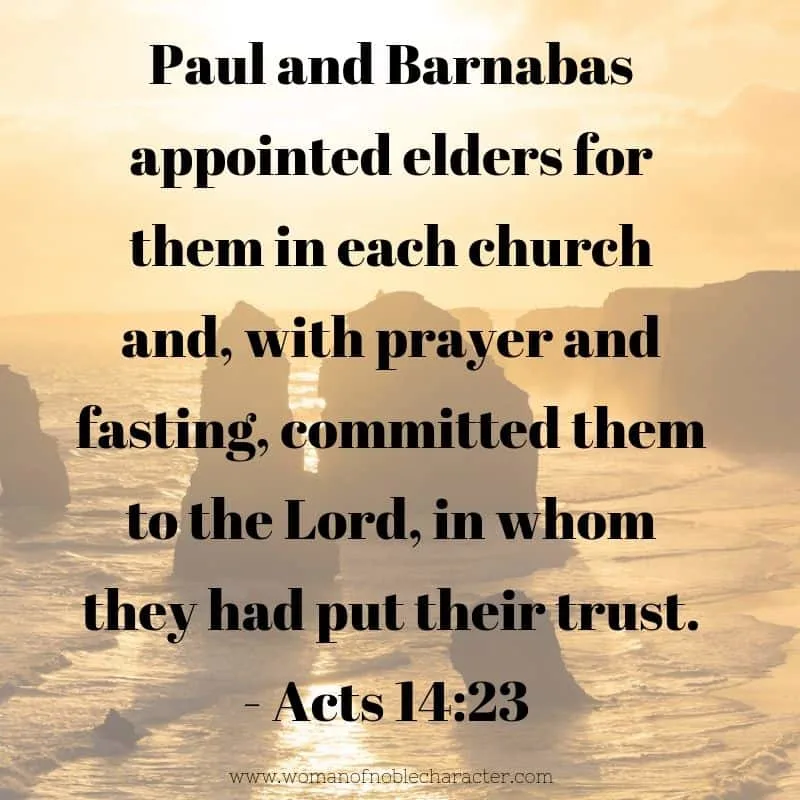
Sexual Fast – 1 Corinthians 7:3-6 says, “
The husband should give to his wife her conjugal rights, and likewise the wife to her husband. For the wife does not have authority over her own body, but the husband does. Likewise the husband does not have authority over his own body, but the wife does. Do not deprive one another, except perhaps by agreement for a limited time, that you may devote yourselves to prayer; but then come together again, so that Satan may not tempt you because of your lack of self-control.
Now as a concession, not a command, I say this.“
Christians today commit to fasting from other activities as well. Some give up entertainment such as TV, Facebook, games, etc. to concentrate on prayer or as a commitment to God. You can fast certain foods (such as chocolate or coffee), but the key is to abstain from something you would miss. Fasting from soda, if you don’t drink it, like me, wouldn’t be an act of faith.
How Long Should You Fast
How long you fast is entirely up to you and by how you feel led by God. All throughout the Old and New Testament, we find examples of fasting in the Bible that last for hours and days or longer.
Random Short Fasts
You may choose to do one of the above types of fasts (food, social media, etc.) for a half day or full twenty-four hours. A short fast is a great first step if you have never fasted before.
A random short fast is a one-time fast for a specific purpose.
Then all the people of Israel, the whole army, went up and came to Bethel and wept. They sat there before the Lord and fasted that day until evening, and offered burnt offerings and peace offerings before the Lord. – Judges 20:26 (ESV)
Intermittent or Scheduled Fasts
An intermittent fast is usually a regular fast, often integrated into one’s spiritual discipline. For example, fasting every Thursday or once a month.
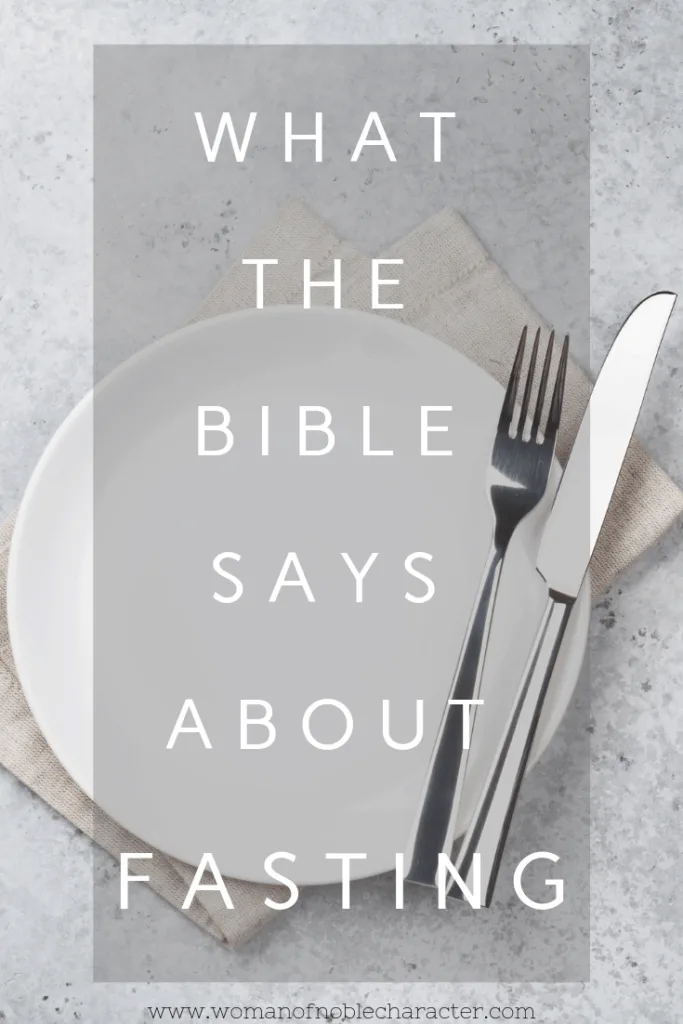
Several Days or Longer Fasts
Longer fasts can include fasts from food but are also often practiced for abstaining from otherworldly desires (such as television, social media, coffee, or soda).
You may choose to do a three or seven-day fast in this case.
“Go, gather together all the Jews who are in Susa, and fast for me. Do not eat or drink for three days, night or day. I and my attendants will fast as you do. When this is done, I will go to the king, even though it is against the law. And if I perish, I perish.” – Esther 4:16
Fasts for Extended Periods of Time
An extended fast is a fast where you abstain from something for a longer period of time.
Catholics, for example, often practice fasting for one or more things for the Lenten season of 40 days.
Note of caution: Abstaining from food and drink for more than a few days has health risks that increase for people with certain medical conditions. Do not undertake an extended fast from food and drink without medical supervision.
When I went up the mountain to receive the tablets of stone, the tablets of the covenant that the Lord made with you, I remained on the mountain forty days and forty nights. I neither ate bread nor drank water. Deuteronomy 9:9 (ESV)
Goal-Oriented Fasts
Some fasts are chosen not for their length of time but to recognize a commitment to a goal. You may wish to practice an open-ended fast which would end when your set goal has been accomplished.
For example, avoid social media or television until you have achieved your goal.
Mark Batterson addresses prayer and fasting to achieve spiritual goals in his book, The 40-Day Prayer Challenge. He also shares some of his own spiritual goals that have been achieved by incorporating fasting into prayer.
Group Fasts
Group fasts can be practiced by small groups, such as families or church Life Groups. They can be practiced by larger groups, such as one entire congregation or, even by a nation during a time of crisis.
Group members can fast at the same time or take turns for a period of continuous fasting.
Group fasts and prayer can be incredibly powerful with unimaginable results and spiritual breakthroughs.
Before Biblical Fasting/How to Prepare
Before you undertake a fast, there are several things to consider and a few you should do to prepare.
Decide what type of fast you will do and for how long. Prayerfully make this decision upon God’s leading.
Prepare your Heart
Fasting should always be grounded in prayer and thanksgiving.
- Ask God to reveal any hidden sins and confess every sin that is revealed, petitioning God for forgiveness.
- Seek forgiveness from anyone you have hurt or sinned against and forgive those who have “trespassed against you”.
- Pray that you would be filled with the Holy Spirit and fully yield your life to God.
Begin your time of fasting and prayer with an expectant heart that you will experience a spiritual breakthrough.
Be prepared for a spiritual attack. As I wrote in my post on my experience during the 40 day prayer challenge, Satan will not be happy about your commitment to God during this time.
Prepare Your Body
If you have any medical conditions or take any daily medications, consult with your doctor before going through a fast of longer than 24 hours.
If you plan on an extended fast, begin to cut down on food about a week before you begin the fast or consider following a vegetarian diet to prepare your body and be sure to increase your water intake, as well.
After Fasting and Ending Your Fast
If you have been doing a fast from food, when you break your fast, you will want to introduce small amounts of food gradually.
Avoid eating a large meal to break your fast. Doing so can have negative physical effects on your body.
Start with fruit or salad and gradually add in more solid food.
9 Tips for Fasting
- Start small. Don’t go from never having fasted before right to a seven-day fast. Start with fasting from a worldly desire first or fasting from sunup to sundown.
2. Try different types of fasting. Instead of going without food, consider giving up coffee or soda for a time or going without television for a week.
3. Drink plenty of water (if the fast you have chosen includes water or liquids).
4. Use a prayer guide for focus and direction.
5. Make a plan for what to do when you are not eating. You may choose to replace breakfast, lunch, and dinner time with focused Bible study and prayer.
6. Review your schedule in advance. For example, you may not wish to fast during a business trip or during a time of extreme stress.
7. Keep in mind that you may not be able to focus as well without food and your thoughts (and prayers) may be all over the place. Be open to prayer “squirrels”, as I call them, scurrying about everywhere.
8. Consider your interaction with others. If you normally eat lunch with a colleague, let them know that you will be fasting and choose to attend without eating or join them but abstain.
If you are married and your fast includes sexual abstaining, discuss this, in advance with your spouse.
9. Each time you feel your stomach growl, use that as a prompt to pray.
10. Get plenty of rest.
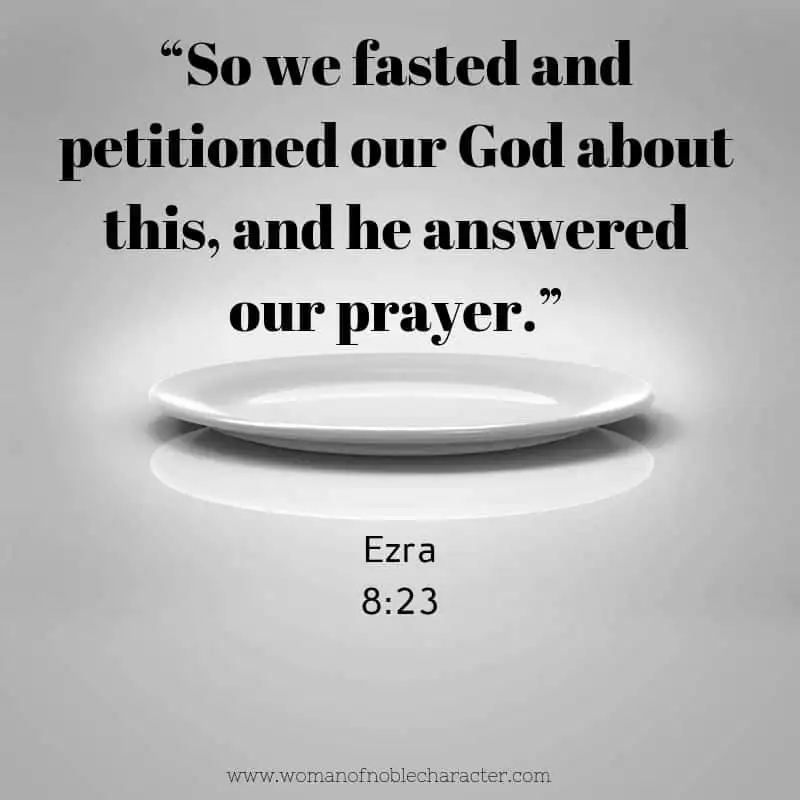
Powerful Prayer During Biblical Fasting
Dear Father,
You are righteous, compassionate, merciful, and loving and all glory and honor are Yours. You are the source of all wisdom and knowledge and bring light into darkness. You have created us to be curious and to seek wisdom and understanding.
We praise you and thank you for hearing our prayers and for Your Son, in whom all treasures of wisdom and knowledge are hidden. We thank you for giving us Your Word to guide us.
Father, please guide me to seek Your wisdom each day. Lord, help us to be obedient to you and your ways. Help us to seek your face each day in all we do.
Jehovah, keep us free from temptation and evil. Help us to turn to you as our stronghold and refuge. Thank you, Lord, for the temptations that we face as they reveal to us our dependence on you.
I am a sinner, Father and I ask forgiveness for my sins. Although I deserve punishment, you are merciful and forgive my fleshly transgressions. I am so sorry for my weakness and rejoice in your mercy.
God, I desire to relentlessly pursue You. Please walk with me and stir in me a passion for you that is unbending.
Wrapping it All Up
Biblical fasting is a deeply personal yet incredibly powerful way to draw closer to God and commit yourself to prayer. If you have never fasted before and are considering adding fasting to your faith tools, take a look at one or all of these recommended resources which will help you understand more about fasting, including why you should fast and how to fast derived from what we learn of fasting in the Bible.
You may also enjoy this short video on what is the Purpose of Fasting // Ask Pastor John:
.
Books:
Fasting for Spiritual Breakthrough: A Practical Guide to Nine Biblical Fasts by Elmer L. Towns
The Power of Prayer and Fasting by Ronnie Floyd
God’s Chosen Fast by Arthur Wallis
Or listen to them on Audible Plus with a free trial!
Have you ever fasted as an act of faith? If so, tell me about it in the comments below. I’d love to hear about your experience with fasting in the Bible.
Along with fasting, making prayer a habit can transform your faith. Read about my experience with the 40-Day Prayer Challenge.
Have you ever wondered about the difference between priests and prophets? You can learn more about this with scriptural references in this post.
In His Love and Mine,
Sue

